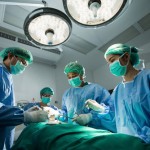
There is a longstanding concern about airway compromise following orthognathic surgery because of facial and upper airway swelling. High-dose short-term corticosteroids have been used for many years with the aim of decreasing the duration of endotracheal intubation, pain and shortening hospital stay. While the use of corticosteroids have become common practice in orthognathic surgery no clear evidence-based protocols are available.
The aim of this review was to assess the effects of perioperative systemic corticosteroids on clinically important outcomes in patients undergoing orthognathic surgery.
Methods
Searches were conducted in the Medline, Embase, Cochrane Central, CINAHL, Lilacs, Scopus, and Web of Science databases with no limits or language. Randomised controlled trials (RCTs) examining any corticosteroid administered systemically by any route, dose or duration were considered. The primary outcomes were postoperative reintubation length of stay, facial oedema and any adverse effects.
Data was abstracted independently by two reviewers with risk of bias being assessed using the Cochrane tool.
Results
- 8 trials involving 234 patients were included.
- Sample sizes ranged from 14 -42 patients.
- All 8 trials were considered to be at unclear risk of bias.
- 5 studies used dexamethasone with methylprednisolone, prednisolone and betamethasone each being used in a single study.
- No trial evaluated the risk of postoperative reintubation.
- One trial evaluated the duration of hospital stay and found no difference.
- 5 trials evaluated facial oedema showing a decrease with use of systemic corticosteroids (standardised mean difference, -1.07; 95% CI; -1.99 to -0.16; [3 studies, n = 80]
- 3 trials reported adverse effects, such as postoperative surgical site bleeding, hypersensitivity, and stomach discomfort with intake of corticosteroids.
Conclusions
The authors concluded: –
The authors observed no evidence of effect of systemic corticosteroids on the risk of reintubation and hospital length of stay in orthognathic surgery. Although facial oedema decrease was observed to be improved with the intervention, adverse effects were inconsistently screened and reported. Thus, the use of systemic steroids in orthognathic surgery is not supported by strong evidence.
Comments
This is a well-conducted review based on an extensive database search. Unfortunately, only a small number of small studies relevant to the question could be identified. None of the studies reported on the reviewers chosen primary outcome or postoperative intubation which was highlighted as an important clinical outcome. In addition, none of the studies were considered to be at low risk of bias.
Meta-analysis of 3 of the included studies did find a reduction in facial swelling with corticosteroid use but there has been no systematic assessment of adverse events. There is also a lack of patient reported outcomes. Well conducted and reported high quality trials are needed to clarify the evidence for the use of corticosteroids.
Links
Primary Paper
Jean S, Dionne PL, Bouchard C, Giasson L, Turgeon AF. Perioperative Systemic Corticosteroids in Orthognathic Surgery: A Systematic Review and Meta-Analysis. J Oral Maxillofac Surg. 2017 Dec;75(12):2638-2649. doi: 10.1016/j.joms.2017.06.014.Epub 2017 Jun 24. Review. PubMed PMID: 28732219.
Original review protocol in PROSPERO

Derek, in 25 yrs if orthognathic surgery, never worried that oedema would cause airway obstruction. Steroids do reduce oedema and make patients more comfortable, reducing analgesia requirements which in turn can suppress respiration
IV Tranexamic acid has transformed the surgery as it reduces oozing per and early post op thereby reducing risk of aspiration